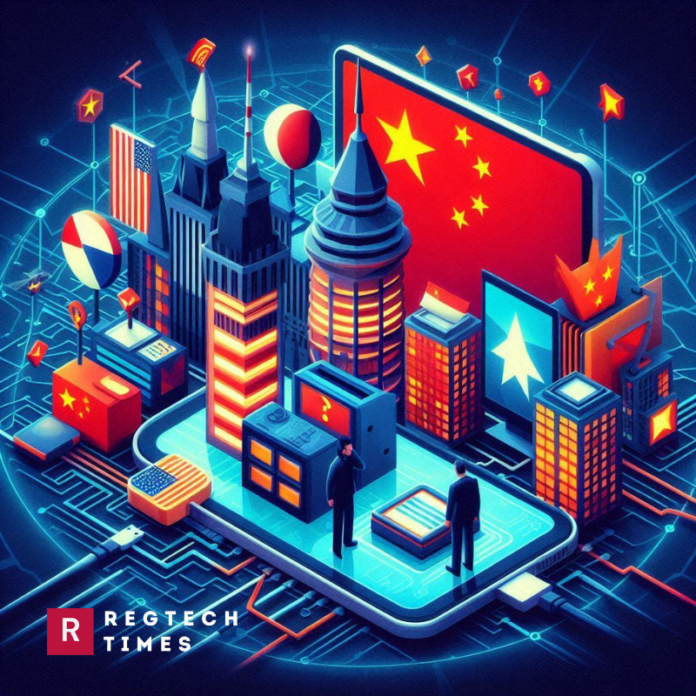The Biden administration is ramping up its scrutiny of China Mobile, China Telecom, and China Unicom, suspecting that these state-backed firms might leverage their access to American data for Beijing’s benefit. This US Probe, spearheaded by the Commerce Department, aims to uncover the extent to which these companies could exploit their U.S.-based internet and cloud services, potentially compromising national security.
The Scope and Nature of the US Probe
The US probe involves comprehensive “risk-based analyses” of China Mobile and China Telecom, with the investigation into China Unicom still in its early stages. Subpoenas have been issued to these companies, signalling a serious intent to uncover any potential misuse of data. Despite the relatively small presence of these firms in the U.S., their services—such as cloud offerings and wholesale internet traffic routing—are significant enough to raise concerns among American authorities. The fear is that sensitive data could be intercepted, manipulated, or handed over to the Chinese government.
Historical Context and Regulatory Actions
For years, China Mobile, China Telecom, and China Unicom have been under intense scrutiny. The Federal Communications Commission (FCC) has taken decisive steps to curb their influence, denying China Mobile’s application for telephone services in 2019 and revoking the licenses of China Telecom and China Unicom in subsequent years. In April 2021, the FCC further prohibited these companies from providing broadband services in the U.S., citing substantial national security risks.
A pivotal factor in these decisions was a 2020 report highlighting instances where China Telecom rerouted internet traffic through China, exposing it to potential interception. Despite China Telecom’s denials and claims that such routing issues are common across all networks, U.S. agencies presented compelling evidence of potential espionage and sabotage risks posed by Chinese telecom firms.
Points of Presence and Cloud Services Under the Microscope
China Telecom’s infrastructure in the U.S. includes several Points of Presence (PoPs), which are crucial for connecting large-scale networks and sharing routing information. These PoPs, especially those located at internet exchange points, are seen as potential vulnerabilities. They could allow China Telecom to access, manipulate, or intercept data flowing through these nodes.
China’s Historic Dump of $53 Billion US Treasuries is Unprecedented Blow to US Economy
Experts warn that data passing through these points is susceptible to metadata analysis and deep packet inspection. These techniques could reveal significant details about the data, such as its origin, destination, and contents. Such access could be exploited for espionage or disruption of services.
Nvidia Sanctions: Impact on Chinese Distributors and the Rise of Domestic Alternatives
The Commerce Department is also investigating the cloud services provided by these companies. The fear is that personal information and intellectual property stored in these clouds could be compromised and relayed to the Chinese government. The US probe has even extended to a specific data center in Silicon Valley part-owned by China Mobile, highlighting the heightened concern over physical infrastructure controlled by Chinese firms on American soil.
Implications of US Probe
Blocking the transactions necessary for these companies to operate within the U.S. could significantly hinder their ability to offer competitive services, potentially crippling their American business ventures. This action would align with the broader U.S. strategy to mitigate the risks posed by foreign adversaries.
U.S. Urges FBI to Investigate Chinese Healthcare Espionage at GenScript and Its 3 Subsidiaries
Experts emphasize the sophistication of China as a global adversary. They support regulatory efforts to close any potential gaps that could be exploited for data interception or espionage. They underscore the dangers posed by Chinese-owned data centers, explaining that ownership provides unique opportunities for unauthorized access and manipulation of client data, posing severe security risks.
Broader Context: The U.S.-China Tech War
This investigation is part of a broader strategy by the U.S. to curtail the influence of Chinese technology firms and prevent potential national security threats. The U.S.-China tech war has seen various measures aimed at restricting Chinese companies’ operations and access to American markets and data.
Tech War Strategy : US Allies Japan and Netherlands Target China’s AI Chip Development
The geopolitical rivalry has prompted the U.S. to adopt a more aggressive stance against perceived threats from China. This includes not only telecom and cloud services but also areas like semiconductor manufacturing, where the U.S. has imposed export controls to limit China’s access to advanced technologies.
Leticia Zheng Exposed in Sinister 7-Year Chinese Espionage Operation at the University of Florida
Navigating the Complex Landscape of Tech and Security
The investigation into China Mobile, China Telecom, and China Unicom underscores the intricate and high-stakes nature of modern tech and security challenges. As the U.S. continues to grapple with the potential risks posed by foreign adversaries, it remains crucial to strike a balance between safeguarding national security and maintaining an open, competitive market.
Chilling Chinese Espionage Plot Erupts at Hotel in Alps Near F-35 Facility
While the current US probe has not yet concluded, it sends a clear message about the U.S. commitment to protecting its data and infrastructure from potential exploitation. The outcome of this investigation could have far-reaching implications for U.S.-China relations and the global tech landscape, shaping the strategies and policies of nations navigating the complex interplay of technology, security, and geopolitics.
In conclusion, as the U.S. scrutinizes Chinese telecom firms’ operations on American soil, the broader context of the U.S.-China tech war looms large. This ongoing US probe is a critical part of a strategic effort to ensure national security in the face of evolving global tech dynamics. The final outcomes and any potential regulatory changes will likely resonate across the tech industry, setting precedents for future international interactions in this domain.



